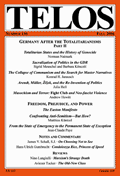 Catastrophic history does not free society: it allows the individual no exit from an endless spiral of destruction. Such destruction promises liberation for some, but it only tilts the world closer to ever-greater annihilation. To place one’s hope in redemptive violence constitutes a leap into the absurd. It is an act of pure faith. This is how Julia Hell, in her essay “Remnants of Totalitarianism: Hannah Arendt, Heiner Müller, Slavoj Žižek, and the Re-Invention of Politics,” reads the apocalyptic politics of Müller and Žižek. Hell frames her critique with a rigorous practicality: she laments Žižek’s “empty terms,” and likewise she sees the political writings of Giorgio Agamben and Judith Butler as hopelessly vague (103). Yet Hell’s rejection of Müller and Žižek does not reflect an entirely pragmatic method. While Hell insists on the need for a usable, specific politics, her attentive readings of each thinker also point to a vast philosophical disagreement. In the end, the true debate is not over the applications of theory. It is instead over the answer to a single question: what is the relationship of politics to death?
Catastrophic history does not free society: it allows the individual no exit from an endless spiral of destruction. Such destruction promises liberation for some, but it only tilts the world closer to ever-greater annihilation. To place one’s hope in redemptive violence constitutes a leap into the absurd. It is an act of pure faith. This is how Julia Hell, in her essay “Remnants of Totalitarianism: Hannah Arendt, Heiner Müller, Slavoj Žižek, and the Re-Invention of Politics,” reads the apocalyptic politics of Müller and Žižek. Hell frames her critique with a rigorous practicality: she laments Žižek’s “empty terms,” and likewise she sees the political writings of Giorgio Agamben and Judith Butler as hopelessly vague (103). Yet Hell’s rejection of Müller and Žižek does not reflect an entirely pragmatic method. While Hell insists on the need for a usable, specific politics, her attentive readings of each thinker also point to a vast philosophical disagreement. In the end, the true debate is not over the applications of theory. It is instead over the answer to a single question: what is the relationship of politics to death?
|
|
||||
|
Telos Press Publishing · PO Box 811 · Candor, NY 13743 · Phone: 212-228-6479 Privacy Policy · Data Protection Copyright © 2024 Telos Press Publishing · All Rights Reserved |
||||







